In a letter from London of 13 September 1764, Leopold Mozart describes English eating habits and diet, roast beef in particular:
Lunch is at 2 o’clock; this consists either in a large leg of roast mutton or roasted beef [in English], which is English roast beef and known in Germany as rost biff since it sounds almost exactly the same when pronounced in English. To go with it, they eat boiled potatoes or beans that aren’t prepared, but hot melted butter is placed in a small separate dish, allowing everyone to pour as much of it as they like on the potatoes and beans. . . And at 8 or 9 in the evening the leg of mutton or roast beef from lunchtime is once again set on the table. Now you need to know that on Sundays the mutton or roast beef is served hot.
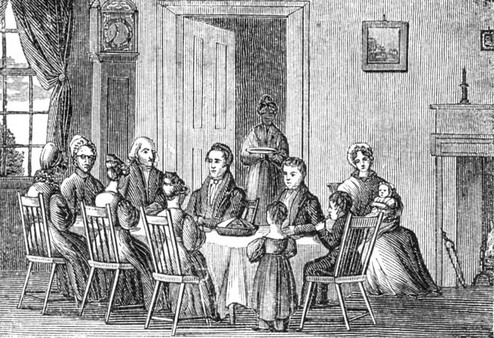
Anonymous, An eighteenth-century dinner (privately owned)
Among numerous recipes for roast beef published in the eighteenth century, Catharine Brooks’s, from her The Complete English Cook (London, 1770) is typical:
For Roasting Beef.
If a Surloin or Rump, you must not salt it, but lay it a good Way from the Fire, baste it once or twice with Water and Salt, then with Butter; flour it, and keep basting it with its own Dripping. When the Smoak of it draw to the Fire it is near enough done.
If the Ribs, sprinkle them with a little Salt Half an Hour before you lay it down; dry and flour it, then butter a Piece of Paper very thin and fasten it on the Beef, put the buttered Side next to the Meat.
👉Never salt your roast Beef before you lay it down to the Fire (except the Ribs) for that will draw out the Gravy.
When you keep it a few Days before you dress it, dry it well with a clean Cloth and flour it all over, then hang it up where the Air may come to it.
Even beyond its culinary importance, it is not out of the question that Leopold was aware, however vaguely, of roast beef’s cultural significance, and in particular the popular ballad Oh! The Roast Beef of Old England. Written by Henry Fielding (1707-1754) for his play The Grub-Street Opera (c1731) and popularized in a setting by Richard Leveridge (1670-1758), the ballad was sometimes performed during dinner at public functions:
When mighty Roast Beef was the Englishman’s food,
It ennobled our veins and enriched our blood.
Our soldiers were brave and our courtiers were good
Oh! the Roast Beef of old England,
And old English Roast Beef!
But since we have learnt from all-vapouring France
To eat their ragouts as well as to dance,
We’re fed up with nothing but vain complaisance
Oh! the Roast Beef of Old England,
And old English Roast Beef!
Our fathers of old were robust, stout, and strong,
And kept open house, with good cheer all day long,
Which made their plump tenants rejoice in this song—
Oh! The Roast Beef of old England,
And old English Roast Beef!
But now we are dwindled to, what shall I name?
A sneaking poor race, half-begotten and tame,
Who sully the honours that once shone in fame.
Oh! the Roast Beef of Old England,
And old English Roast Beef!
When good Queen Elizabeth sat on the throne,
Ere coffee, or tea, or such slip-slops were known,
The world was in terror if e’er she did frown.
Oh! The Roast Beef of old England,
And old English Roast Beef!
In those days, if Fleets did presume on the Main,
They seldom, or never, return’d back again,
As witness, the Vaunting Armada of Spain.
Oh! The Roast Beef of Old England,
And old English Roast Beef!
Oh then we had stomachs to eat and to fight
And when wrongs were cooking to do ourselves right.
But now we’re a… I could, but goodnight!
Oh! the Roast Beef of Old England,
And old English Roast Beef!
To listen to Oh! The Roast Beef of Old England, click here.
The tune of Oh! The Roast Beef of Old England was popular throughout the eighteenth century and well into the nineteenth, not only with its original words but often with more contemporaneous and topical, sometimes political, texts, including ‘The Tories Last Shift, or, The Sin of Ingratitude Displayed’ and ‘The Tory Mask pulled off: or Truth and Loyalty dissected’ (both 1780), ‘The Politic Farmer: or, a Fig for Taxation’ (1787), and ‘You Radicals all come listen to me’ (undated but eighteenth-century); as late as 1837 the tune was parodied to celebrate the succession of Queen Victoria to the English throne (‘Our new Queen, the Flower of England’), in 1841 to celebrate the birth of Victoria’s son, Albert Edward, later Edward VII (‘Arrived at Last. An Heir to the Throne of England’), and in 1851 to celebrate the opening of the Great National Exhibition.1
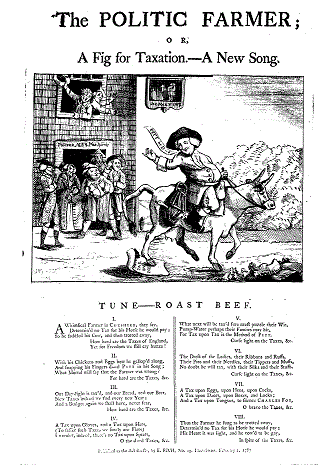
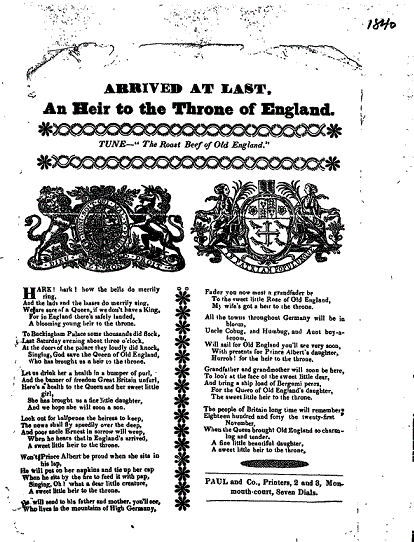
Not all of the broader implications of the ballad, however, are likely to have been understood by Leopold: while the song explicitly condemns the influence of French taste and fashion in both food and dancing (a reaction in part to the derogatory eighteenth-century reference to the English as rosbif by the French), it implicitly, and more generally, ridicules Catholicism. At least this was one of the points of William Hogarth’s 1748 painting The Gate of Calais or O, the Roast Beef of Old England (published as a print in 1749): ‘The fisherwomen wearing crucifixes on the left seem to pray to the cheap flat fish in front of them. In the background, through the gate, ‘superstitious’ locals are kneeling before the Cross, beneath a tavern sign of a dove, symbol of the Holy Ghost, in Hogarth’s mockery of the Eucharist. More earthly nourishment, however, comes in the form of the unattainable sirloin of British beef.’2
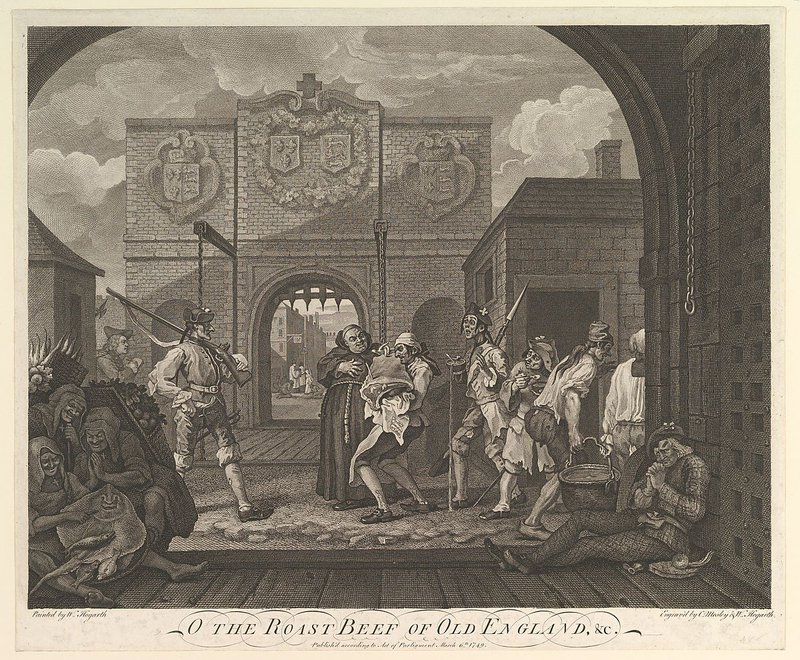
William Hogarth, The Gate of Calais or O, the Roast Beef of Old England, engraving 1749
Hogarth’s painting and engraving inspired a musical setting, The Roast Beef Cantata, by the lawyer and songwriter Theodosius Forest (1728-1784), a friend of Hogarth’s:
‘Twas at the gate of Calais, Hogarth tells,
Where sad despair and famine always dwells,
A meagre Frenchman, Madame Grand-sire’s cook,
Ah home he steered, his carcase that way took.
Bending beneath the weight of famed Sirloin,
On whom he’d often wish’d in vain to dine,
Good Father Dominick by chance came by,
With rosy gills, round paunch, and greedy eye;
Who, when he first beheld the greasy load,
His benediction on it he bestowed;
And as the solid fat his fingers press’d,
He lick’d his chaps, and thus the knight address’d:
“Oh, rare roast beef, lov’d by all mankind,
If I was doom’d to have thee, when dress’d and garnish’d to my mind,
And swimming in thy gravy, not all thy country’s force combin’d
Should from my fury save thee.
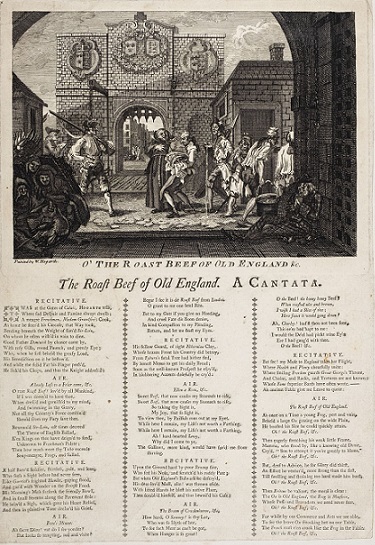
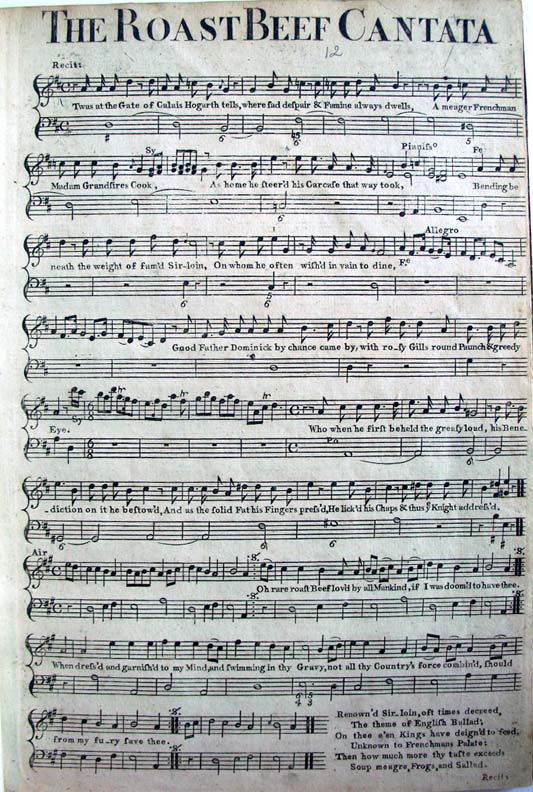
Similarly – though somewhat later in the century – ‘dinner’ (and by implication roast beef as a dinner staple) stood as a metaphor for British naval superiority over the French in James Gillray’s John Bull taking a luncheon: – or – British Cooks, cramming Old Grumble-Gizzard, with Bonne Chére: ‘John Bull, gross and obese, seated at a table covered with the emblems of naval victory, looks towards British admirals, who advance towards him wearing aprons over their uniforms, but with stern expressions, holding out dishes containing captured French ships. John, knife in his right hand, about to swallow a French ship speared on his fork.’3 At first glance, the French ships could be mistaken for slices of roast beef.
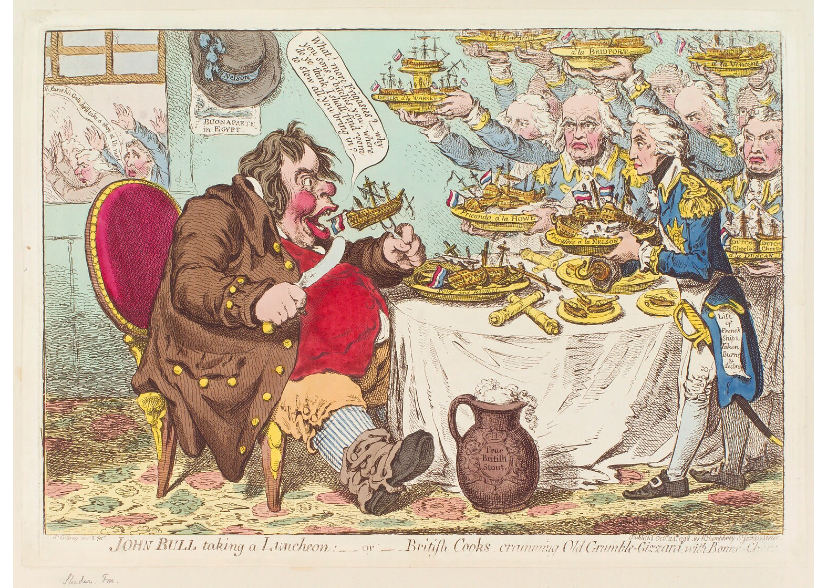
Gillray’s print celebrated the British victory over the French at Aboukir Bay in August 1798; the admiral closest to the viewer is Horatio Nelson.
Not only was Leopold unlikely to have understood all the implications of the ballad – and he would hardly have appreciated its anti-Catholic bias if he did – but he probably would have condemned its music as well. On 27 November 1764 he wrote to Lorenz Hagenauer:
Although the poor are generously provided for, there are vast numbers of them; few, however, risk begging in public since this is forbidden; instead, they have a different way of demanding alms, namely, by selling posies of flowers in the summer, while others sell toothpicks made from quills, others again sell copper engravings or matches or sewing thread or different-coloured ribbons and so on. Others sing as they pass along the street and sell printed songs, which is the most common method and one that we quickly tired of hearing.
FOOTNOTES
1 http://ballads.bodleian.ox.ac.uk/search/?query=roast+beef.
2 https://www.tate.org.uk/art/artworks/hogarth-mosley-o-the-roast-beef-of-old-england-the-gate-of-calais-t03918.
3 https://www.britishmuseum.org/collection/object/P_1868-0808-6778.


